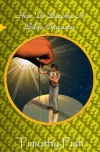
And Thy House
Extra Feature: High Res Image

History of
Cane Creek
Association
by D. F. Magruder
The Rules of Writing Novels
Written By: Timothy Fish Published: 1/31/2008
Visit enough author blogs and forums frequented by authors and you are likely to learn about some of the rules of writing. The rules I am referring to are not the rules that you will learn in an English class. These rules are usually based on what acquisition editors have rejected. The rules listed below are some of the rules that other authors have mentioned. My intent is to make this a living document, so as I learn of new rules I will be adding them to the list. Some of these rules may contradict each other. That’s okay. These rules are based on the perception of rejected authors rather than what publishers have clearly defined. It is very likely that there are published novels that violate many of these rules.
- Show, Don’t Tell – Let the reader see through action and dialog rather than telling the reader what happened through exposition.
- Avoid Passive – Always tell who is doing the action.
- Don’t Head Hop – Pick a Point of View character and stick with him. Don’t tell what Bob is thinking in one paragraph and then tell what Joe is thinking in the next.
- Use Adverbs Sparingly - This rule comes from a post on Brandilyn Collins' blog.
- Avoid "to be" Verbs in Narrative - This rule comes from a post on Brandilyn Collins' blog. Here the problem is that "to be" verbs tend to be weak. Perhaps, I should say that "to be" verbs do not invoke the sense of movement that other verbs do.
- Only Use Dialog Attribution Tags When Required – Avoid things like “My name is Joe,” Joe said. He folded his arms across his chest.” Say instead, “My name is Joe.” He folded his arms across his chest.
- Don’t Italicize Thoughts – This may be okay for a voice in the character’s head, but there is no need to italicize the thoughts of the point of view character.
- Don’t Use Present Tense – Instead of She walks into the room and sits down say She walked into the room and sat down. Present tense is often hard to read.
- No Author Intrusion – Author intrusion is when it is clear that the author is speaking directly to the reader rather than the reader seeing the story only as the point of view character sees it.
- No Omniscient Viewpoint – With the omniscient viewpoint, the person telling the story is capable of telling the reader everything. He knows everything about the history. He knows what all the characters are thinking. He knows how the story is going to turn out. For an example of the omniscient viewpoint: If Bob had known that Jane was standing in line on the other side of town, he wouldn’t have been in such a hurry to get home.
- Always Use First Person or Third Person Limited Point of View – This rule primarily applies to Christian novels. The idea is that the author is supposed to bring the reader as close to the story as possible. (Even thought Second Person is the closest a reader can get to the story.)
- Never Use Second Person – When you write, you never want to use second person. If you do, you will make it difficult for your readers to follow the story.
- Never Have More Than One Main Character – This is apparently a rule in Christian fiction. Never tell the story from the point of view of more than one character. I understand that more than one manuscript has been rejected for breaking this rule. It should be noted, however, that every highly successful author has ignored this rule on multiple occasions.
- No More Than Three Dead Bodies – This is another rule for Christian novels. Apparently, having too many people die is a valid reason for editors to reject a manuscript that is targeted at a Christian audience.
- Don’t Have a Character Answer the Phone – The idea here is that people don’t need all of the details of the phone ringing, someone answering it, the generic comments at the beginning of the conversation, etc.
- Don’t Repeat Unusual Words or Phrases – While repetition may not be so noticeable to an author because of the length of time it takes to write the story, readers will pickup on it.
- Avoid –ing Sentences – Sentences like, Straightening his glasses, he picked up the book are considered a bad idea.
- Don’t Switch Point of View – Authors should not switch from first person to third person or third person to first person, etc.
- Write for All Denominations – When writing Christian fiction, avoid writing anything that may be considered offensive to any particular denomination.
- Avoid Clichés – Avoid such things as cold as ice or black as night.
- Use All Senses – Don’t just tell the reader what the characters heard. Tell the reader what the character felt, smelled, tasted, saw and heard.
- Don’t Use Stereotypes – Relying on stereotypes can result in a predictable story. Instead of a librarian who likes to read, have one who would prefer to water ski, for example
- Use Stereotypes – Stereotypes, when used well, can provide a reader with a wealth of information about a character without requiring the author to slow down and describe a character in detail.
- Listen to Suggestions – The author that agents and editors dislike the most is the author who believes his writing is perfect and cannot be improved by the suggestions of others.
- Don’t Portray Sin in Good Light – For Christian fiction, activities that are considered sin by large portions of the audience should not be portrayed in a in a good light. In some cases it should not be mentioned.
- No Offensive Words in Christian Fiction – Don’t use words that a preachers wouldn’t say from the pulpit.
- All Rules of Writing Are Only Suggestions – As you look at the rules above, you will find that some of them are good, some are not so good and some contradict each other. None of them are absolute. Applying many of these rules may help your writing, but there are situations where some of these rules should be thrown out. There are also situations where some additional rules might apply. The author must make that determination. The author’s goal is to write a good story that gets the message across to the reader.
If you know of other rules that publishers apply to writing, please feel free to comment.
www.timothyfish.com



